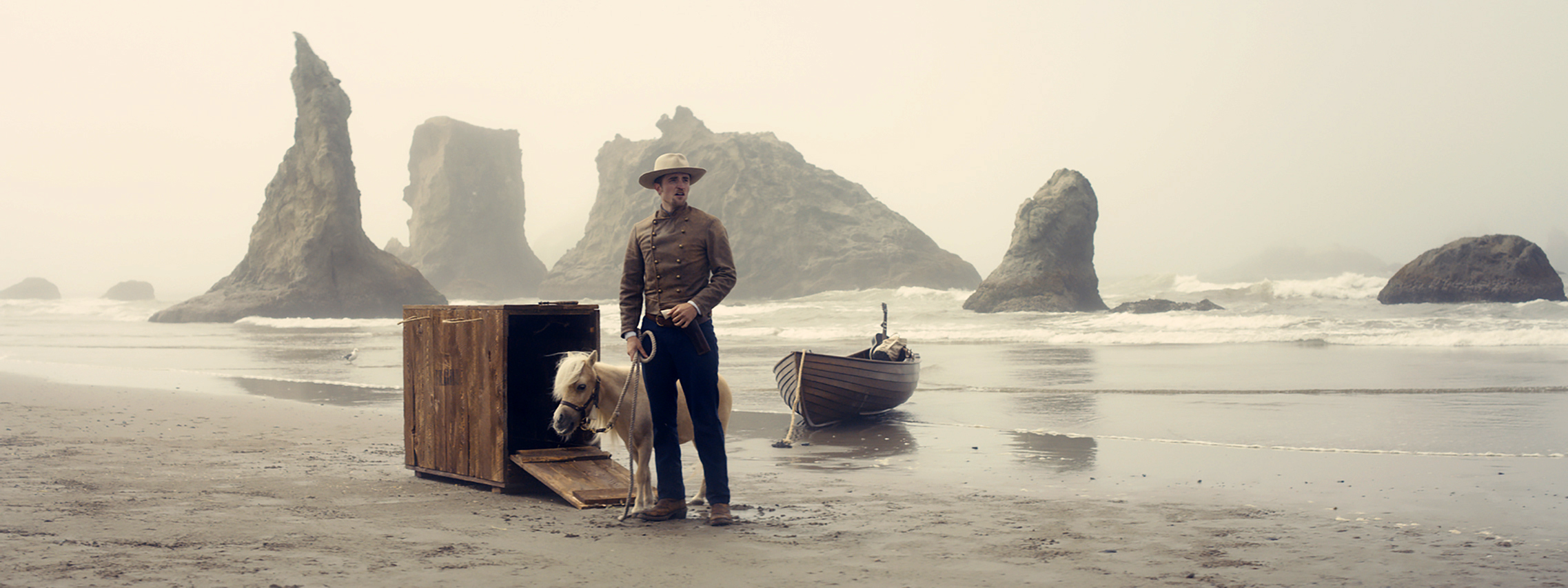In Damsel, it's the men who are in distress
With cutting dialogue and some bloody slapstick, the Zellner brothers put masculinity through the wringer


A free daily email with the biggest news stories of the day – and the best features from TheWeek.com
You are now subscribed
Your newsletter sign-up was successful
Robert Pattinson makes a striking introduction in his latest film, Damsel. As wealthy pioneer Samuel Alabaster, he arrives on screen rowing a dinghy alone through choppy waters. After deftly navigating rocky outcroppings and making it to shore, he tips his cargo — a weathered wooden crate — over on the sand and pries it open, freeing the horse he's stowed inside.
Samuel cuts a classic Western figure on the beach, in his leather coat and Stetson hat. Guitar and rifle slung across his back, he strolls into a dusty frontier town like he owns the place. Eventually, he saunters into a bar. And then he starts talking.
In an instant, we understand Samuel's true nature: He's not an embodiment of Western machismo at all. He's a total dandy. Our first clue was his steed, who emerges from the crate to reveal that he is not a stallion but rather a miniature horse named Butterscotch. The next sign is Samuel's aversion to whiskey, which gives him a sour tummy. When a bar patron calls him a coward for avoiding the drink, Samuel responds, almost pleadingly, "My stomach is, from time to time."
The Week
Escape your echo chamber. Get the facts behind the news, plus analysis from multiple perspectives.

Sign up for The Week's Free Newsletters
From our morning news briefing to a weekly Good News Newsletter, get the best of The Week delivered directly to your inbox.
From our morning news briefing to a weekly Good News Newsletter, get the best of The Week delivered directly to your inbox.
Samuel is soft. And he's just the first of many pathetic men David and Nathan Zellner trot out in Damsel, their scathing mockery of the Western's traditional machismo. Damsel is a "men on a mission" film devoid of true men or a true mission, and it deploys wit and slapstick to put masculinity on trial.
Samuel's purpose is ostensibly pure: He's off to marry his intended, the gal of his dreams, Penelope (Mia Wasikowska). She's "precious like a flower," he sighs to his hired hand, Henry (David Zellner), a parson he's brought along to officiate the union. She's good at "thinkin', cookin', sewin' ... she's good at readin' words, even good at kissin' and lovemakin'. What more could you ask for?" There are just two pesky details that Samuel neglects to share with Henry until they're nearly at their destination — the first being that before Henry can marry the pair, he and Samuel will have to rescue Penelope, who's been snatched by a rapscallion named Anton Cornell (Gabe Casdorph) and his brother, Rufus (Nathan Zellner).
The second minor hiccup: Penelope isn't Samuel's fiancée. Never was, never will be. She's in love with Anton. They live in idyll on a secluded farmstead in the woods — that is, until Samuel arrives and ruins everything.
It's Henry, not Samuel, who winds up killing Anton, accidentally firing his rifle and blowing the man's head off in the middle of his morning micturition. This is not a coincidence: Henry is a meek man, far removed from traditional Western figures capable of unearthing hidden grit and bravery when circumstances demand. That he ultimately kills the so-called villain — and by mistake — instead of Samuel, who's supposed to be our savior, is a deliberate tip of the hand by the Zellners.
A free daily email with the biggest news stories of the day – and the best features from TheWeek.com
Samuel is responsible, however, for setting the whole ordeal in motion by playacting the hero. But by the time we leave the farmstead, it's clear he's nothing but a deluded brute.
This all probably sounds horrific on the page, but it's hilarious in motion. The scene proceeds like a violent Looney Tunes bit, defining its characters through appalling incompetence. Anton's mid-stream execution isn't funny, per se — he's simply not the villain Samuel makes him out to be — but the Rube Goldberg-style mechanics of his death are fundamentally absurd, from Henry's boot-shaking terror at the prospect of shooting a man in cold blood to the unintended squeeze of his trigger finger. Morally, we shouldn't laugh, but it's impossible not to chuckle at the sheer ineptitude and foolish tragedy of what unfolds.
From this carnage, we learn that Penelope never loved Samuel. "The only love up here was between me and Anton," she spits, "and you took that away from me." Penelope wields her ferocious sense of agency like a weapon, berating Samuel in no uncertain terms. She then destroys the cabin she shared with Anton and outfits Henry with a vest composed of leftover explosives. He'd rather not wear it, unsurprisingly, but as Penelope's holding a rifle he doesn't have choice.
Unlike Samuel and Henry, Penelope is capable and sharp — and this is where Damsel's subversion is at its least subtle. She is no damsel, she takes guff from no man. She refused to be "saved" by Samuel and has no patience for Henry. Neither will she bend to Rufus, the brother of her late lover, who tries to pressure her into marriage per frontier custom. And she's certainly not going to go quietly with Zacharia Running Bear (Joseph Billingiere), the fifth man to appear in the film with the aim of protecting her.
Zacharia's entrance perfectly sums up Damsel's thoughts on Western male gallantry. Watching Penelope and Rufus argue over marriage from behind the cover of a tree, Zacharia pegs Rufus as a threat, and Penelope, of course, as a damsel in distress. In a misguided attempt at gallantry, Zacharia intervenes in the conflict — with explosive results.
When a bewildered and furious Penelope demands to know who he is and what he wants, Zacharia tells her, "You were in danger." He says it as fact, but she disagrees: "I had it under control!" she snaps. "He's just trying to save us, Penelope," Henry interjects before she cuts him off, summing up her worldview: "I don't need anybody's saving!"
The Zellners direct the scene with allegro tempo, with each beat and line of dialogue zipping by at comic speed. It's a crossfire of words, not bullets or arrows. And that's the point.
Damsel shows just how facile the traditional fierce Western archetypes are by excising them entirely: The gentle hero turns out to be a creep. His partner in adventure is an alcoholic sad sack. The outlaws are just average Joes who want to be left alone. The supposedly valiant passerby is only interested in whether Penelope is available.
There's no nobility in Western masculinity, Damsel posits — just masculinity in absentia.
Bostonian culture journalist Andy Crump covers the movies, beer, music, and being a dad for way too many outlets, perhaps even yours: Paste Magazine, The Playlist, Mic, The Week, Hop Culture, and Inverse, plus others. You can follow him on Twitter and find his collected writing at his personal blog. He is composed of roughly 65 percent craft beer.
-
 The 8 best TV shows of the 1960s
The 8 best TV shows of the 1960sThe standout shows of this decade take viewers from outer space to the Wild West
-
 Microdramas are booming
Microdramas are boomingUnder the radar Scroll to watch a whole movie
-
 The Olympic timekeepers keeping the Games on track
The Olympic timekeepers keeping the Games on trackUnder the Radar Swiss watchmaking giant Omega has been at the finish line of every Olympic Games for nearly 100 years
-
 Walter Isaacson's 'Elon Musk' can 'scarcely contain its subject'
Walter Isaacson's 'Elon Musk' can 'scarcely contain its subject'The latest biography on the elusive tech mogul is causing a stir among critics
-
 Welcome to the new TheWeek.com!
Welcome to the new TheWeek.com!The Explainer Please allow us to reintroduce ourselves
-
 The Oscars finale was a heartless disaster
The Oscars finale was a heartless disasterThe Explainer A calculated attempt at emotional manipulation goes very wrong
-
 Most awkward awards show ever?
Most awkward awards show ever?The Explainer The best, worst, and most shocking moments from a chaotic Golden Globes
-
 The possible silver lining to the Warner Bros. deal
The possible silver lining to the Warner Bros. dealThe Explainer Could what's terrible for theaters be good for creators?
-
 Jeffrey Wright is the new 'narrator voice'
Jeffrey Wright is the new 'narrator voice'The Explainer Move over, Sam Elliott and Morgan Freeman
-
 This week's literary events are the biggest award shows of 2020
This week's literary events are the biggest award shows of 2020feature So long, Oscar. Hello, Booker.
-
 What She Dies Tomorrow can teach us about our unshakable obsession with mortality
What She Dies Tomorrow can teach us about our unshakable obsession with mortalityThe Explainer This film isn't about the pandemic. But it can help viewers confront their fears about death.
